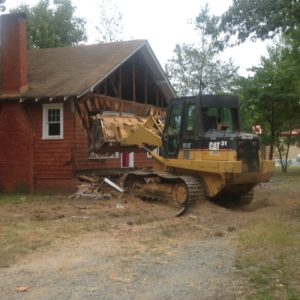 There is a common story for real estate investors whom bought and/or did a cash-out refinance with real estate over the past 2-6 years. You know the line -right? “I barely have any equity or I’m underwater”. At a minimum there is concern , perhaps even thoughts of walking away, and the inevitable fear of how will this impact me? As both a hard money lender and property manager in Charlotte, North Carolina, I run across this issue all of the time. Yes -one needs to consider all the options and look at it as a business decision; however, I think some are overlooking some common reasons to maintain that real estate investment -even with some negative cash flow.
There is a common story for real estate investors whom bought and/or did a cash-out refinance with real estate over the past 2-6 years. You know the line -right? “I barely have any equity or I’m underwater”. At a minimum there is concern , perhaps even thoughts of walking away, and the inevitable fear of how will this impact me? As both a hard money lender and property manager in Charlotte, North Carolina, I run across this issue all of the time. Yes -one needs to consider all the options and look at it as a business decision; however, I think some are overlooking some common reasons to maintain that real estate investment -even with some negative cash flow.
One needs to remember that a real estate investment is more complicated than just investing in a mutual fund or stock. With real estate one has the ability to use leverage (via financing) and depreciation (for tax deferral). For the most part, a real estate investment is a long-term investment -especially if your equity is nil. When you buy a piece of real estate, your also buying (or locking in) a loan. Ideally its a fixed rate loan with a 30 year amortization for maximum cash-flow flexibility. If your wholesaling and/or rehabbing to retailing homes, your running a business were the name of the game is inventory turn (short-term holds); unless of coarse, a purchase doesn’t go as planned.
So what’s my point?
You see most of us real estate investors (meaning those of us who already own multiple investment properties with 4-10 bank financing loans) don’t have the option of standard long-term bank financing in today’s environment. For the top 10-20%, the availability of commercial loans are available -yet most are with 5-7 year balloons.
So my point is?
Do you have a fixed rate loan of 6.25% over thirty years on that property you’ve held for the past 3 years? What do you think the odds are that interest rates over the 27 years of the loans remaining life will be greater. I would bet 100% odds -probably within the next 10 years. You see you have more than a rental property you have this loan fixed for thirty years. A loan that maybe cheaper to maintain over the next 27 years than a competing landlord who may pay less in pricing terms but more in financing terms. Walking away from that investment with the thought of getting a better cash-flowing one is great -until you realize your new financing options are severely limited with that lost compounding effect more than likely able to offset the cash-flow difference.
Even if it is negative cash-flowing every month, it maybe worth keeping. Pencil out the pros/cons of keeping that rental property and loan. Can you afford some negative monthly cash-flow? Is paying an extra $100-300/month (or more) into a rental investment any different than making a $100-300/month investment into a mutual fund? People say its negative cash-flow like your losing money -but are you really? On a surface level that’s no different than saying your losing money on that monthly outflow into the mutual fund too. Sure its money out of your pocket; however, its maintaining an investment for long-term wealth creation.
This is a rental right? The goal is to operate this rental investment as efficiently as possible to maximize on our compounding wealth machine. That means screening for the best of tenants, maintaining the property for long-term preservation, and slowing tenant turnover for consistent cash-flow. Those tenants are still paying the majority of your rent -correct? Yes, ideally we want the tenants rent to cover all expenses and then some -remember this article is about whether one should keep that challenging investment or not. So in theory, They are really paying down the majority of that loan you have. Right? Let’s pretend you have a $150k house (today’s valuation) versus the $165k loan that you put on the property 3 years back. If the tenant is going to pay that loan down to $85k in some 15-20 years (or hopefully sooner), and the property is still only worth $150k, might it be worth holding onto that investment?
Now I’m looking at this from a very simplistic viewpoint. One could bring up many counter points; however, the point is that perhaps holding onto the real estate investment you think is a dog -really isn’t. Pencil out all the numbers, pull out the amortization table (month principal vs. interest payments over life of loan), calculate how much you’d invest into another investment (like stocks, mutual funds, cds, etc.,) and see if your cash flow can handle any negative outflow. To view total returns, you need to look at any potential tax write-offs too. Again, pencil it all out -you really have no idea otherwise!
Unfortunately, I rarely ever hear of an investor penciling out the numbers more than saying: “It’s costing me $150/mo in negative cash-flow”. OK, I understand that it is costing you money every month. Let me ask though -you are feeding an investment no different than putting money into any other type of investment. Assuming you can afford it, perhaps that real estate investment with locked in financing maybe a good investment for long-term wealth creation after-all.
Remember there are no guarantee’s with investing (no matter what its in) or being self-employed. Calculate the risks, diversify, and don’t be so quick to jump from one hot idea to the next. Now I’m not saying there are times when one has to take a loss and move on; however, staying put maybe just the solution.


